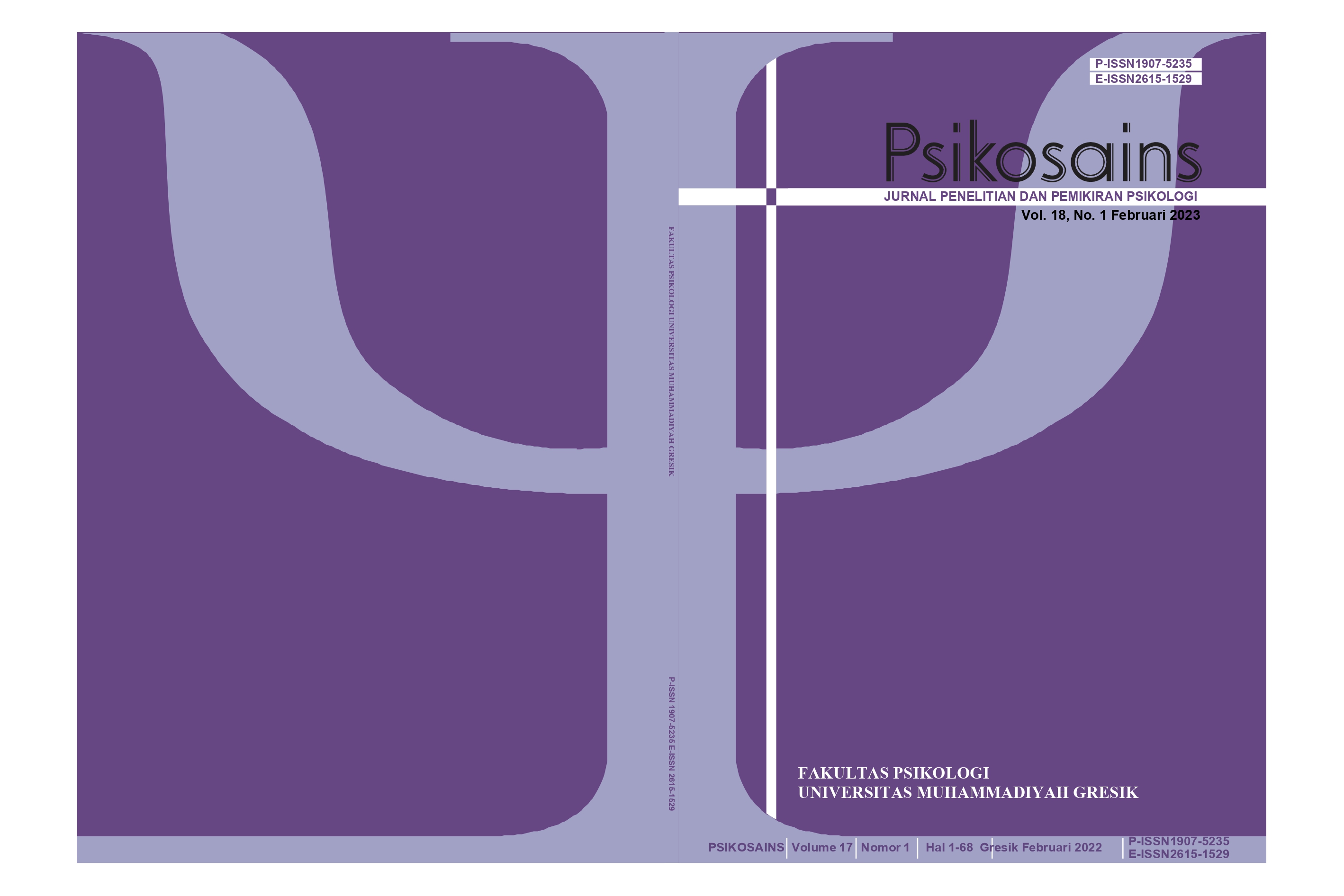Pengaruh Internal Locus Of Control Terhadap Perilaku Prososial Pada Siswa SMAN 1 Menganti-Gresik
DOI:
https://doi.org/10.30587/psikosains.v18i1.5313Keywords:
Internal Locus of Control, Prosocial Behavior, StudentsAbstract
This study aims to empirically examine the effect of internal locus of control on prosocial behavior in students at SMA Negeri 1 Menganti – Gresik. This study analyzes the data obtained from a sample of 267 people. The measuring scale used is the Sala Internal Locus of Control and the Prosocial Behavior Scale. The statistical analysis method used is simple linear regression analysis. The results show that significance (p) = 0.000 less than 0.05 which means that the internal locus of control has a significant influence on prosocial behavior in students at SMA Negeri 1 Menganti – Gresik with internal influence locus of control on prosocial behavior of 23.1%. The results of the categorization of this study indicate that the subject has a moderate category on prosocial behavior and a moderate category on internal locus of control.
References
April, K., Dharani, B & Peters, K. (2012). Impact of Locus of Control Expectancy on Level of Well-Being. Review of European Studies, 4(2), 124-137. 10.5539/res.v4n2p124.
Baron, R.A & Byrne, D. (2005). Psikologi Sosial. Edisi 10 : Jilid 2. Jakarta: Erlangga.
Beaton, D., Bombardier, C., Guillemin, F. & Ferraz, M.B. (2000). Guidelines for The Process of Cross-Cultural Adaptation of Self-Report Measures. Spine, 25(24), 3186-3191.
Bella, L.N., Santi, D.E & Ananta, A. (2020). Korelasi Antara Locus of Control Internal Dengan Perilaku Prososial Pada Relawan MRI Surabaya . Sukma : Jurnal Penelitian Psikologi, 1(02), 153-163.
Darmawan, C. (2017). Hubungan Antara Konsep Diri Dengan Perilaku Prososial Siswa Sma Muhammadiyah 1 Malang. PSIKOVIDYA, 19(2), 94-105.
Eisenberg, N. & Mussen, P.H. (1989). The Roots of Prosocial Behavior In Children. New York: Wiley.
Hidayah, S. & Haryani. (2013). Pengaruh Keadilan Distributif dan Keadilan Prosedural Terhadap Kinerja Karyawan BMT Hudatama Semarang. Jurnal ekonomi manajemen akuntansi, 20(35), 1-15.
Firmansyah, N. & Mahmudah. (2012). Pengaruh Karakteristik (Pendidikan, Pekerjaan), Pengetahuan dan Sikap Ibu Menyusui Terhadap Pemberian ASI Eksklusif di Kabupaten Tuban. Jurnal Biostatika dan Kependudukan, 1(1), 62-71.
Noya, M.D.A. (2018). Hubungan Antara Internal Locus of Control Dengan Perilaku Prososial Pada Pelajar di SMA Negeri 1 Halmahera Utara. Jurnal HIBUALAMO, 1, 10-17.
Phares, E. J. (1967). Locus of Control In Personality. New Jersey: General Learning Press.
Rotter, J. B. (1966). Generalized Expectancies for Internal Versus External Control of Reinforcement. Psychological Monographs : General and Applied, 80(1), 1-28.
Saguni, F. (2022). Pengaruh Locus of Control Terhadap Religiusitas Mahasiswa IAIN Palu. Musawa : Journal of Gender Studies, 14(2). 168-194.
Sarasdewi, P.M.P. & Widiasavitri, P.N. (2020). Hubungan Internal Locus of Control dan Kecerdasan Emosional Terhadap Perilaku Prososial Remaja di Kota Denpasar. Jurnal Psikologi Udayana, (SI), 196-206.
Sarwono. (2006). Metode Penelitian Kuantitatif dan Kualitatif. Yogyakarta: Graha Ilmu.
Sugiyono. (2006). Statistika Untuk Penelitian. Bandung: Alfabeta.
Sugiyono. (2015). Metode Penelitian Manajemen. Bandung: Alfabeta.
Sumijah. (2015). Locus of Control Pada Masa Dewasa. Seminar Psikologi dan Kemanusiaan, 384-391.
Wildan, M. (2022). Hubungan Antara Locus of Control Internal Dengan Perilaku Prososial Pada Anggota Karang Taruna. Skripsi. Universitas 17 Agustus 1945 Surabaya.
Zanden, J. W. (1988). The Social Ecperience : An Introduction To Sociology. New York: Random House.



